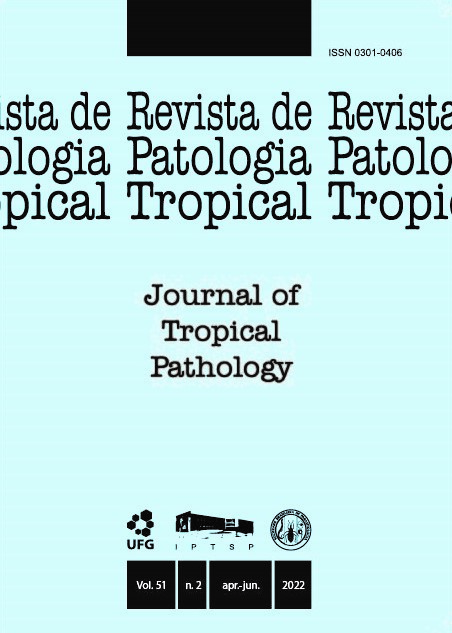Mosquitoes (diptera: culicidae) in bamboo internodes in the northwestern region of the state of Rio Grande do Sul, Brazil
DOI:
https://doi.org/10.5216/rpt.v51i2.70392Resumo
Bamboo internodes can serve as a breeding ground for a diverse mosquito fauna, some with relative epidemiological importance. The goal of this study is to determine the mosquitoes´ species found in the bamboo internodes at the northwestern region of Rio Grande do Sul, Brazil. From September 2016 to August, 2017 immature forms of mosquitoes were collected from bamboos (Bambusa sp.), in the quarterly intervals (ten plants per collection) through 0.5 cm in diameter perforations on 40 internodes sides. After 30 days, the perforated internodes were cut out and their contents were taken to the laboratory where the immature forms of mosquitoes developed to adult stage were identified. A total of 367 immature forms of Culicidae were collected, however only 158 (43.1%) have developed to adult stage and were identified at a specific level. Eight species were identified: Onirium personatum (Lutz, 1904), Sabethes aurescens (Lutz, 1905), Sa. intermedius (Lutz, 1904), Sa. purpureus (Theobald, 1907), Shannoniana fluviatilis (Theobald, 1903), Trichoprosopon pallidiventer (Lutz, 1905), Wyeomyia limai (Lane & Cerqueira, 1942) and Wyeomyia serratoria (Dyar & Nuñez Tovar, 1927). Thus, the study showed the importance of this type of breeding in order to maintain the mosquito fauna in the wild areas in the studied region. The finding of the species On. personatum and Sh. fluviatilis was also reported for the first time in the State.
KEY WORDS: Fitotelmata; Onirium; Sabethini; Shannoniana; bamboo; mosquitoes.
Downloads
Downloads
Publicado
Como Citar
Edição
Seção
Licença
The manuscript submission must be accompanied by a letter signed by all authors stating their full name and email address, confirming that the manuscript or part of it has not been published or is under consideration for publication elsewhere, and agreeing to transfer copyright in all media and formats for Journal of Tropical Pathology.

